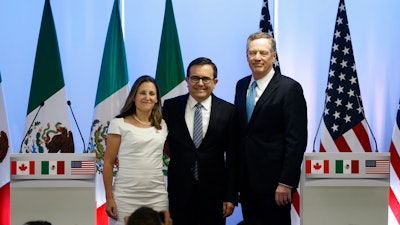
MEXICO CITY (AP) — The second round of talks on renegotiating the North American Free Trade Agreement ended Tuesday amid resistance to discussing Mexico's low wages and large differences over dispute resolution mechanisms.
The head negotiators for all three countries at the talks in Mexico City said progress had been made, but U.S. Trade Representative Robert E. Lighthizer said some areas were going to be challenging.
"There's no secret that the labor provisions will be contentious and that it's our objective to have provisions that raise wage rates in Mexico," Lighthizer said. "I think that's in the interest of Mexicans and in the interest of the United States."
He also said that while the U.S. had proposed eliminating the current dispute resolution mechanism, "we haven't had any detailed negotiations" on the system, which is known as Chapter 19.
Text was coming together for most chapters of the treaty, however, including small and medium enterprises, competitiveness, digital trade, services and the environment.
"The strategy is to conclude in the short term those things that can be concluded" and then tackle the thornier issues, Mexican Economy Secretary Ildefonso Guajardo said.
Regarding energy, Guajardo said "there are no points of difference or controversy." He said the main question was whether it should have its own chapter or be spread across all chapters.
But those close to the talks said relatively few concrete proposals appear to have been made on contentious issues like dispute-resolution mechanisms, seasonal farm tariffs and regional content rules.
The United States wants to eliminate the Chapter 19 private arbitration panels, while Canada wants to keep them. The panels can overrule tariffs, making it harder for the United States to unilaterally block products.
"It is clear that there are differing positions on Chapter 19," Guajardo said.
Produce growers, many of whom have operations in all three countries, said they like the current dispute resolution system. They said changing it might force them to adjudicate disputes in courts in one of the three countries, a prospect they don't relish.
"I think industries across all three countries have found Chapter 19 to be an effective, timely method for dealing with disputes," said the head of the United Fresh Produce Association, Thomas Stenzel. Repealing it "could certainly make it a much more complicated, legalistic process."
The U.S. also wants to tighten labor standards and local content rules in products like autos. But business groups want to keep wages out of the talks. Lighthizer declined to go into detail on either of those topics.
"I think mandating wages becomes very difficult across multiple countries," said Stenzel. "Within the trade agreement itself we believe that the workers' standards of fair treatment, addressing forced labor, child labor, those issues, is appropriate. But when it comes to wages we don't feel that that is as appropriate in the trade agreement."
Mexico has drawn plants and investments by capitalizing on low wages and weak union rules, and Mexican business and labor leaders appear to be resistant to any attempt to tighten labor standards or ensure that Mexican wages rise.
Mexican and Canadian auto unions have said in a report that Mexican autoworkers earn about $3.95 an hour, which is about one-ninth of average wages north of the border.
The United States also wants to increase minimum levels of regional content in products like autos, so that fewer parts are imported from Asia or Europe, assembled in Mexico and labelled "made in North America."
As for seasonal anti-dumping tariffs, Stenzel said growers don't like the idea though that proposal appears not to have been formalized yet. Such measures seek to protect producers like tomato growers in Florida against surges in Mexican imports. Stenzel and other big producers fear it could be extended to apply to other crops.
The five days of talks in Mexico City were held in around two dozen working groups. The first round of talks took place in Washington in mid-August and the next round will be held Sept. 23-27 in Ottawa, Canada.





















